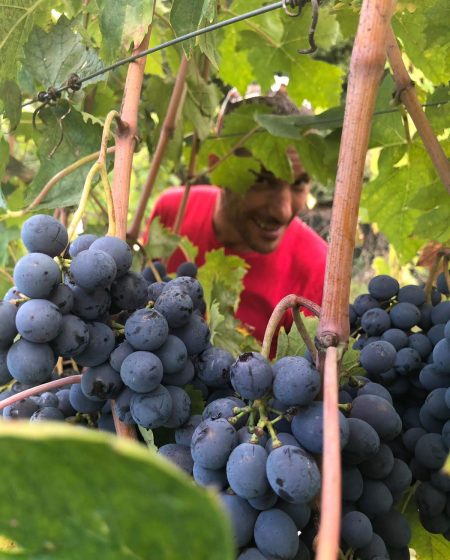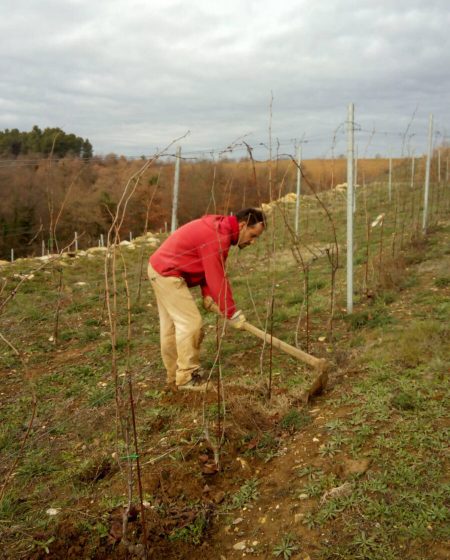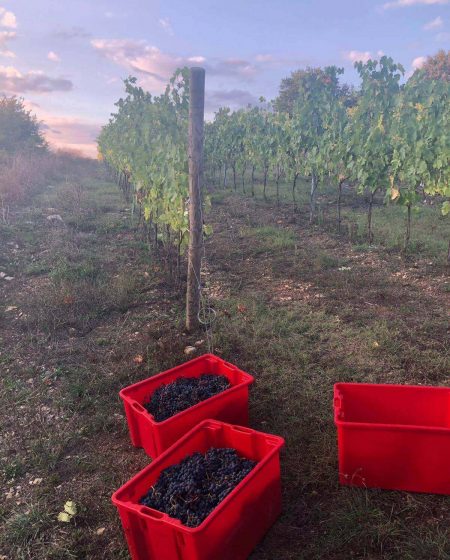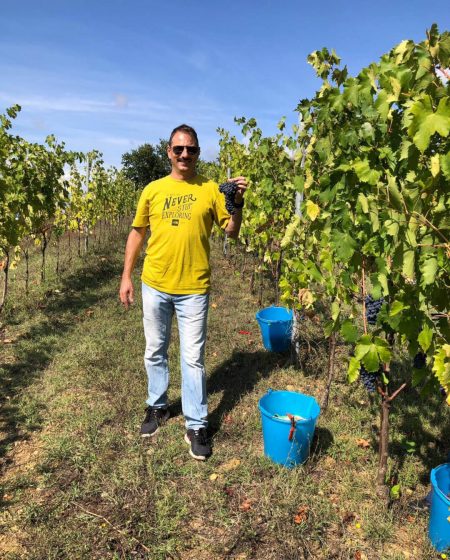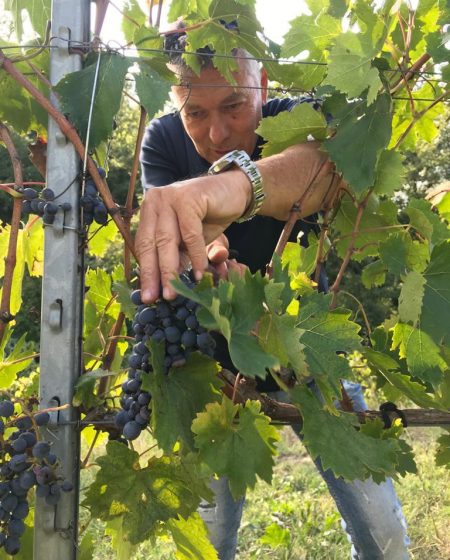Wine
Vino Sanguis Jovis
Sanguis Jovis. Sangue di Giove (meaning blood of Jupiter). Sangiovese. Sanguis Jovis is a red wine, full-bodied, well structured with floral and spicy scents. The nose is broad and the taste is reminiscent of fresh fruit, that is, the grape as it was before fermentation.
Why Sanguis Jovis is a special wine? Well…our vineyard grows on particularly rocky ground. What looks like dry and poor soil is actually a diamond for the vineyard. Mineralized stone gives special organoleptic characteristics to the wine. Another peculiarity is the minimum dosage of sulphites introduced during wine processing. In many cases it’s sulphites and not wine itself that causes headache next day. You can then enjoy our wine and feel good the day after.
For the phytosanitary defense only products allowed in organic farming are used. Coverage products that, contrary to systemic ones, do not enter the plant and then find themselves in the wine. In the field we strictly adhere to the organic disciplinary. The use of herbicides is avoided and natural and non-chemical fertilizers are used.
To improve the quality, a strong selection of the sprout is carried out in the field which is the major condition for wine quality. All the necessary processes are carried out on the shoots not only to ensure a correct balance between the number of bunches of grapes and the shoot, but also a correct exposure of the bunches to light and air, relevant for their correct ripening and their health. Pruning, selection of the shoots, sprinkling, topping, selection of the bunches are carried out manually to obtain a more accurate work. We literally put our hands on every process.
The higher the quality of the blend that enters the cellar, the higher the quality of the wines that come from the cellar. Even in the cellar, nothing is overlooked. In the first phase of vinification, many pumpovers are carried out to “capture” the colors, tannins and flavors of the skins. Sanguis Jovis is opened several times through outdoor pumping over and delestages in order to bring out as much as possible those scents and organoleptic characteristics that characterize it.
At the end of a deliberately slow alcoholic fermentation, necessary for the interaction between wine and skins, the wine is placed in steel tanks that are always full for the necessary drying and to carry out the malolactic fermentation by controlling the temperatures. From a malic acidity, harsh and wrinkled, we will thus pass to a soft and smooth lactic acidity and to a less rough and rounder wine. In order to enhance its refinement and complexity of aromas, Sanguis Jovis is left to rest in wood, first in barrels and then in barriques for about a year.
Recommended way to drink red wine
It is strongly recommended to pour our wine into decanters before its consumption or in any case to open the bottle at least half an hour in advance. In order to capture the complexity of the aromas, it is recommended to drink it in suitable glasses for red wine. The serving temperature shall be around 18 degrees.
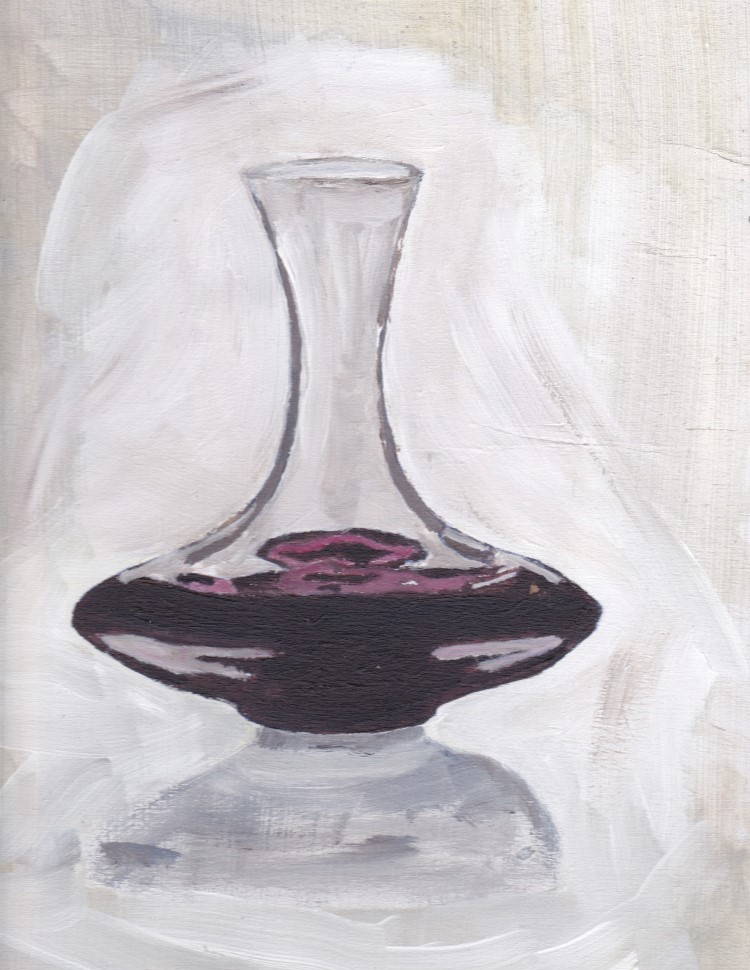
Decanter
The decanter is a special container similar to an ampoule that serves to decant a wine, so that it can develop the aromatic bouquet of a mature, aged wine in the best way..

Glasses for aged and full bodied wines
On the left: the body of the glass must be large in order to allow an adequate oxygenation and development of the aromas. The opening of a glass is narrower than its body that aids the concentration of complex aromas. On the right: the glasses so called balloons have a larger body to allow the right oxygenation of red wines aged for a long time in the bottle and with tannins that have already taken on a softer character.
Vino Dagmar
The name Dagmar means, in Scandinavian etymology, a daughter of light. It is the name of Wolfgang’s mother. A name that lends itself well to this bright and clear wine.
In fact, the Dagmar wine has a bright golden yellow color with bronze reflections. The nose opens with hints of ripe yellow fruit, floral notes of yellow flowers accompanied by spicy hints of ginger. The taste is warm and soft but with good flavor that facilitates and enriches the drink.
The finish is pleasant and persistent. To be enjoyed at a temperature of 12 degrees as an accompaniment to fish soups or typical Umbrian hard cheeses.
Works in the vineyard and cantina
